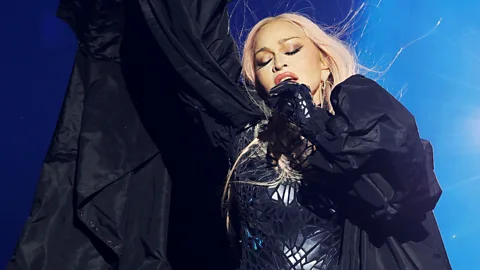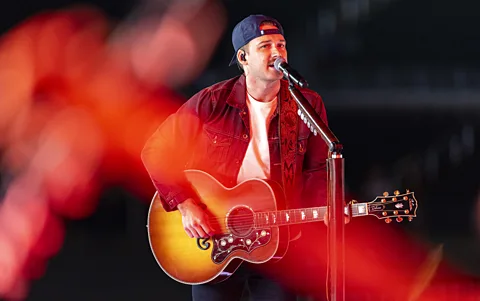Two fans are suing Madonna for lateness. Could this case change the live music industry?
 Getty
GettyWhen Madonna sang Express Yourself, it’s unlikely the pop juggernaut meant through a lawsuit. Two angry Madonna fans have done just that, though, taking legal action against the star – and in the process, they are putting the artist-fan relationship to the test.
As reported on Friday, Michael Fellows and Jonathan Hadden sued Madonna for starting a 13 December concert at Barclays Center in Brooklyn, New York, more than two hours late. According to the suit, the plaintiffs allege the delay "left [them] stranded in the middle of the night", where they encountered "limited public transportation, limited ride-sharing, and/or increased public and private transportation costs". Barclays Center and Live Nation are also named in the suit, and Madonna's representatives issued a statement that they "intend to defend this case vigorously."
Madonna is hardly the first artist to cause a stir with her lateness.
Last April, Frank Ocean started his headlining Coachella set an hour late after allegedly deciding backstage to scrap a portion of his performance that involved an already-built ice rink. Ocean delivered an uneven and disjointed performance that left fans, many of whom had traveled for the rare chance of catching the Thinkin Bout You star live, wanting more.
Later that month, country megastar Morgan Wallen waited until his scheduled set time at the University of Mississippi's Vaught Hemingway Stadium to announce he had lost his voice and would cancel that night's show. Wallen issued full refunds to fans, but many were still irate with the Last Night hitmaker, with one fan, Brandi Burcham, filing a lawsuit against Wallen for breach of contract and negligence. She soon dropped the suit.
But the latest lawsuit against Madonna may well be a first. Nashville-based entertainment lawyer Michael Ransom tells BBC Culture that this suit stands out from similar actions taken by fans in the past, as the plaintiffs and their legal team "threw everyone into the pot to see who these claims might stick against".
"If you look at the very first page of the complaint under the defendant section, it's not just the artist here," Ransom says. "It's the ticketing service, the promoter, the venue, that sort of thing. It's a common practice in the litigation space to add as many defendants as you might possibly be able to state claims against, because, quite frankly, if one of them got booted out for some reason, you'd have others there to carry the torch."
Ransom explains that having multiple defendants leaves room to shift blame, with the ultimate question being, "Whose obligation was it to inform people [the concert would start late]?" He also notes that this lawsuit differs from other similar suits in its allegations of "fraud and deceptive advertising, as opposed to straight breach of contract". A portion of the suit reads, "Defendants' actions constitute not just a breach of their contracts… but also a wanton exercise in false advertising, negligent misrepresentation and unfair and deceptive trade practices."
"I think that's what makes this a little bit unique," he says. "The plaintiffs here are not hanging their hat simply on the breach of contract claim. And I suspect they know that there's at least some good chance that that claim may be dismissed. Whether that ultimately happens or not, obviously, is up to the court. But, in this situation, that may be what fuelled them to throw these additional claims in, much like the additional defendants, just to see what, if anything, a court would say applies or doesn't apply."
The plaintiffs also couched their suit as a class action lawsuit, which entails additional requirements to be certified by the court, including a "minimum number of individuals necessary to sustain a class".
"I suspect that if there's enough people out there that are willing to put their names on this thing, that they'll be able to satisfy those [requirements]," Ransom says. "Then the question becomes, for the defendants, whether or not this claim, this case, in general, is something that they want to spend time and money fighting, or whether they just want to make it go away as quickly as possible, whether by refunding people their ticket prices or something like that, before it really gains steam and gets off the ground."
With concert tickets growing more expensive and purchasing them becoming more competitive, lawsuits like these could happen more often. And if fans don't pursue legal action, they may still speak out with their wallets. We spoke with Marcie Allen, president of Nashville-based MAC Consulting, who is an industry leader in concert programming and has served on the board of the Country Music Association (of the CMA Awards) and Barclays Center itself. She believes an artist-fan relationship is only healthy if it's grounded in mutual respect.
"There is no show without the artist-fan relationship, so of course an artist owes ticket buyers a quality performance for their money," she tells BBC Culture. "That means a reasonably long show that starts more or less on time. The setlist, stage, arrangements and costuming are all the artist's choice, but coming on two hours late or only playing three songs ultimately screws all parties. Those fans would never buy another ticket, and, eventually, that artist would never sell out another show."
Roots rocker Elle King tested the fan-artist contract over the weekend when she took the stage for a birthday celebration in honor of Dolly Parton while apparently drunk, declaring herself "hammered". Among other things, King couldn't remember the lyrics to Parton's song Marry Me. Several fans expressed frustration on social media, and the Opry itself apologised on Monday, writing in response to a fan on X: "Hi Judas, we deeply regret and apologise for the language that was used during last night's second Opry performance."
 Getty Images
Getty ImagesRansom says that the outcome of the lawsuit against Madonna could have far-reaching implications for the broader concert industry, too, depending on how it is resolved. For example, could a time limit be imposed allowing artists a certain level of lateness – an hour of grace, perhaps, or even two, before concertgoers are entitled to refunds? If so, where exactly is the line separating appropriate from excessive lateness? And will fans feel empowered to sue artists for yet additional "offences"?
"Can we say, 'From this point forward, two hours is the line?'" he says. "Okay, well, what happens when the next person comes out and says, 'Hey, Trans-Siberian Orchestra went on five minutes late. I'm going to try it with a five-minute claim'. So, whether or not [this suit] has precedential effect, it really will depend, I think, on how broadly or narrowly the laws at issue are interpreted."
Allen thinks that if the plaintiffs in the Madonna case win their suit, it could offer trigger-shy would-be concertgoers a greater sense of security when spending hundreds, if not thousands, of dollars on tickets.
"Ticketing giants like LiveNation are always so quick to create endless rules and caveats that force fans to spend big money and time to attend shows," from requiring hours-long queues to charging $10 for a cup of water or £12 for bag storage if your purse is just a tad too big. "But people often forget that a ticket is a contract that works both ways," she says. "If the Madonna fans win this suit, maybe it will restore some of the value fans can expect when they spend their hard-earned money."
If you liked this story, sign up for The Essential List newsletter – a handpicked selection of features, videos and can't-miss news delivered to your inbox every Friday.
If you would like to comment on this story or anything else you have seen on BBC Culture, head over to our Facebook page or message us on Twitter.
This article was updated on 26 Jan.
